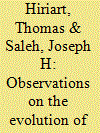|
|
|
Sort Order |
|
|
|
Items / Page
|
|
|
|
|
|
|
| Srl | Item |
| 1 |
ID:
094094


|
|
|
|
|
| Publication |
2010.
|
| Summary/Abstract |
Space applications are used for countering a wide variety of external security threats but their use for the provision of internal security (for non-military threats like terrorism, organised crime or illegal immigration) is still largely neglected. Several steps have recently been taken to consider space applications for counter-terrorism and other internal security threats. In the context of the general call for a specific European security research programme, the European Union's Framework Programme for Research and Technological Development (FP 7) is conducting several projects using space applications for fighting internal security threats. However, current attempts remain scattered across national and European initiatives, policy fields and pillars, institutional actors and actors involved in various projects. There is thus a strong need for a more integrated approach at the EU-level through a European Internal Security Strategy complementing the existing European Security Strategy. The US has been looking at the provision of homeland security for some time. A revision of existing structures in Europe should thus not neglect the dimension of transatlantic cooperation in this policy area.
|
|
|
|
|
|
|
|
|
|
|
|
|
|
|
|
| 2 |
ID:
094093


|
|
|
|
|
| Publication |
2010.
|
| Summary/Abstract |
The international community is entering an era of shared global utilities from space and is increasingly reliant on space systems and activities that support a myriad of applications and utilities on Earth. A growing number of states are seeking to develop or extend their space capabilities. At the same time, a variety of non-state actors are also extending their involvement in space activities. The United Nations is the principal inter-governmental forum to deal with various space issues of global importance. Moreover, the United Nations system itself has become increasingly reliant on space systems for its day-to-day operations. In order for the United Nations to play its necessary role in the space arena, it will need to be supported by a space policy. A United Nations space policy would provide over-arching guidance on space activities for UN stakeholders in the space arena; it would inform UN participation in space activities and would promote improved coordination and cooperative governance of outer space activities. A world without a common UN space policy will not be able to respond to the challenges of the rapidly evolving space arena in the 21st century.
|
|
|
|
|
|
|
|
|
|
|
|
|
|
|
|
| 3 |
ID:
094102


|
|
|
|
|
| Publication |
2010.
|
| Summary/Abstract |
Satellites have been rightly described as the lifeblood of the entire space industry and the number of satellites ordered or launched per year is an important defining metric of the industry's level of activity, such that trends and variability in this volume have significant strategic impact on the space industry. Over the past 40+ years, hundreds of satellites have been launched every year. Thus an important dataset is available for time series analysis and identification of trends and cycles in the various markets of the space industry. This article reports findings of a study for which we collected data on over 6000 satellites launched since 1960 on a yearly basis. We grouped the satellites into three broad categories - defense and intelligence, science, and commercial satellites - and identified and discussed the main trends and cyclical patterns for each of these. Institutional customers (defense and intelligence, and science) accounted for over two-thirds of all satellites launched within our time period (1960-2008), and, in the 1960s and 1970s, they accounted for 90% and 73.5%, respectively. A fair conclusion from this data is that the space industry was enabled by, and grew because of the institutional customers, not commercial market forces. However, when the launch data is examined more closely, a growing influence of the commercial sector is noticeable. Over the past two decades communication satellites accounted for roughly half of all launches, thus reflecting an important shift in the space industry in which the commercial sector is playing an equal role (on a launch volume basis) to that of the institutional market. Cyclical patterns in the satellite launch volume over the past decade are separately discussed before we sum up with a conclusion.
|
|
|
|
|
|
|
|
|
|
|
|
|
|
|
|
| 4 |
ID:
094098


|
|
|
|
|
| Publication |
2010.
|
| Summary/Abstract |
This article explores the use of scenario analysis as a methodology to rigorously analyze potential space futures, particularly with respect to space security challenges, in the context of rapid and uncertain change across several dimensions of human space activities. The successful use of scenario analysis in other (e.g. corporate and military) sectors is described and results of an initial scenario analysis workshop are presented. Scenario analysis is recommended as a promising approach to evaluating the long-term consequences of various policy choices in the context of uncertainty, and as a process well-suited to fostering communication and building consensual knowledge among diverse stakeholders.
|
|
|
|
|
|
|
|
|
|
|
|
|
|
|
|
| 5 |
ID:
094096


|
|
|
|
|
| Publication |
2010.
|
| Summary/Abstract |
Based on a joint study initiated in 2007-2008 by the Policy planning staff (CAP) of the French Foreign Ministry and the space agency CNES, which brought together experts, researchers and industry insiders, this article considers the factors behind Russia's recent resurgence and the possible revival of its space programme. It examines how far the latter will require international cooperation in order to progress further and discusses likely areas of profitable collaboration with Europe in general and France in particular, given that country's long history of space cooperation with Russia and the need in the mid-term future to share the burden of developing ambitious new space programs. While there is in principle much potential, especially in the area of space transportation, there are also numerous challenges and uncertainties. How these are resolved will affect the level and success of any cooperative efforts of both sides.
|
|
|
|
|
|
|
|
|
|
|
|
|
|
|
|
| 6 |
ID:
094099


|
|
|
|
|
| Publication |
2010.
|
| Summary/Abstract |
The paper reports research into the transfer of technology typically used in the construction of scientific satellites. Four case studies are analyzed to clarify some basic mechanisms of the transfer of space technology to the industrial system. The paper finds that the technologies analyzed in the construction of satellites for the most part stem from the integration of technical processes already known in various industrial sectors; the use of these processes in space involves their substantial strengthening and upgrading in terms of performance; and this upgrading permits them to return to industrial sectors that use the technological advances acquired for coping with complex problems in the space sector. This research has helped validate some of the determinants of technology transfer already noted in the literature, while increasing the number and content of these. Useful indications emerge for policy makers and agents involved in technology transfer programs.
|
|
|
|
|
|
|
|
|
|
|
|
|
|
|
|
|
|
|
|
|